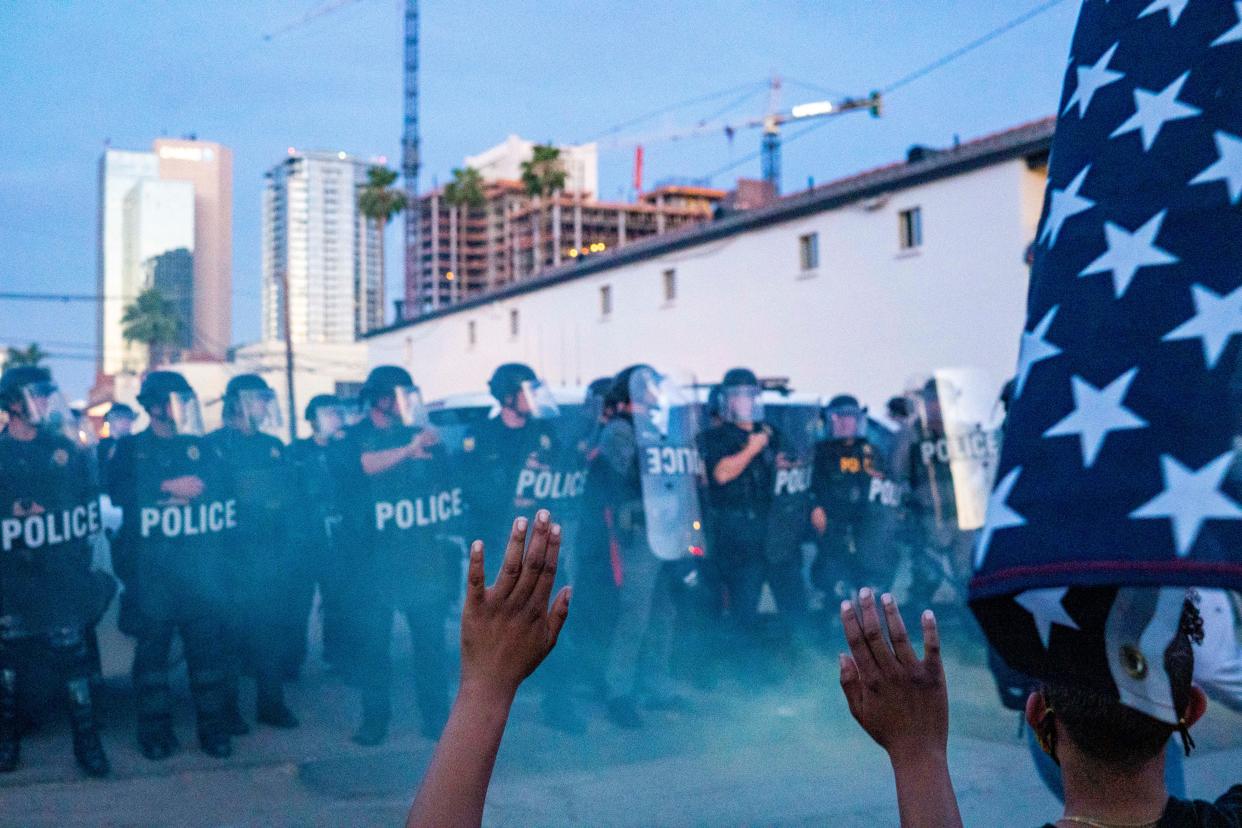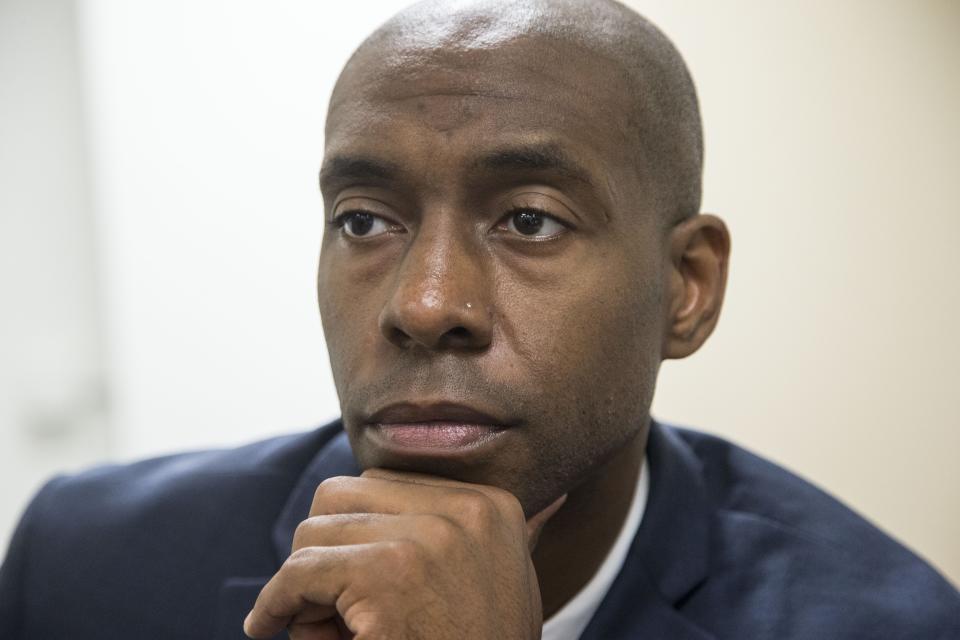What is worse, structural racism or individuals who are racist? Answers differ by race

Jasmine Grayer is a full-time caregiver at a group home for elderly people. But the 24-year-old Phoenix woman earns extra cash by delivering food from restaurants to private homes as a driver for a popular online delivery app.
While driving to homes in affluent neighborhoods in Phoenix and Scottsdale, she said she is sometimes followed by the police until the police see her get out of her car and realize she is delivering food. It's happened twice in December alone, said Grayer, who is Black.
Most recently, Grayer said she was at a stoplight in Scottsdale on a delivery with a friend who is Native American. A police vehicle pulled up alongside. It was dark and Grayer said she believes the officer could see her face illuminated by the light from the cellphone mounted on her dashboard, which she uses to map her delivery.
When the traffic signal turned green, the officer pulled up behind her, Grayer said. She believes the officer was running her license plate and tags. The officer then followed her for several miles until she arrived at her delivery, a home on a cul de sac in an affluent neighborhood.
When she got out of the car with a bag of food, she saw the police vehicle drive off. But after Grayer finished her delivery, she says she saw the police vehicle parked about a block away, waiting until she left the neighborhood.
Grayer shared the story as an example of why she believes that structural racism is a bigger problem for Black people than individuals who are racist.
"Racism is definitely systematic," Grayer said, while eating lunch with a friend at the food court at the Christown Spectrum Mall in north central Phoenix.
A new study underscores Grayer's view. The study by the Pew Research Center found Americans are much more likely to believe racism by individuals is a bigger problem for Black people than structural racism. In contrast, Black people are more likely to believe that structural racism is a bigger problem.
The different ways Black people and other Americans see racism is significant as the nation continues to grapple with the issue in the wake of the death of George Floyd, a Black man killed by a white police officer in Minneapolis in 2020.
The killing sparked a national discussion over how to achieve greater justice and equality for Black people. But the findings show that Black people have different views regarding the causes of racism than other Americans. Those views are often based on the lived experiences of Black people, and understanding those differences can be useful in moving forward, experts say.
"When it comes to racism, we know that Black adults are very conscious of racial discrimination in the United States," said Khadijah Edwards, a research associate at the Pew Research Center and co-author of the study.
Sixty percent of adults who are Black say that racism is an "extremely big problem" for Black people in the U.S., Edwards said. And about 80% say they have personally experienced discrimination, she said. Seventy percent of Black people say discrimination is the main reason Black people can't get ahead, she said.
"So we know this is sort of a top-of-mind issue for Black adults," Edwards said.
Given that, "we were curious if Black adults see structural racism or racism by individual people as being more problematic for Black people in the United States," Edwards said.
A Scottsdale Police Department spokesman said the department has a "zero-tolerance policy concerning any biased-based profiling."
"The department does not condone the unethical or unequal treatment of citizens based on bias-based profiling. Scottsdale officers perform their duties and apply the law impartially and without prejudice or discrimination,” Sgt. Kevin Quon said in a written statement.
Additionally, all Scottsdale police employees attend mandatory implicit bias training "and learn about the harmful effects that engaging in bias-based decision making can have in the community we serve," Quon said.
Quon said people who suspect misconduct are encouraged to contact the department's Internal Affairs Division to file a complaint that can be investigated, "as we take any accusation seriously," he said.
Black people more likely to say structural racism is a bigger problem
The Pew study found that 64% of Americans believe racism by individuals is a bigger problem than structural racism. In contrast, about half of Black Americans said they believe structural racism is the bigger problem, while 42% said racism by individuals is the bigger problem, according to the study, released in November.
The study also found attitudes about racism differ by political party and age. Majorities of Republicans and Democrats say racism by individuals is a bigger problem for Black people than structural racism, the study found. But Republicans and Republican-leaning independents are more likely to hold this view than Democrats and independents who lean Democrat, 73% versus 59%.
Republicans also are more likely than Democrats to say that there is no discrimination against Black people in the U.S. today, 19% vs. 3%, the study found.
Democrats, meanwhile, are more likely than Republicans to say that structural racism is a bigger issue than individuals who are racist, 38% vs. 7%, respectively.
A majority of people across all age groups say that racism by individual people is the bigger problem for Black people in America than structural racism.
However, "younger adults are more likely than their older counterparts to say that structural racism is a bigger problem than individual racism for Black Americans," the study found.
A survey conducted shortly after George Floyd's murder found that a majority — about 60% — of Black people believed the increased attention to issues of race and racial inequality would lead to changes that would improve the lives of Black people, Edwards said.
But subsequent surveys show that optimism has waned. About 65% of Black people now say that increased attention has not led to changes that have improved the lives of Black people, Edwards said.
Poll of Black adults suggests need for change
About nine of 10 Black adults say the criminal justice system needs at least minor changes to ensure fair treatment for Black people. What's more, at least 94% of Black people say either a minor change, major change or complete overhaul is necessary for policing, the courts and judicial process and the prison system.
Roughly half of Black adults say policing, the courts and judicial process, and the prison system need to be completely rebuilt for Black people to be treated fairly. Smaller shares say the same about the political, economic and health care systems.
Findings don't surprise ASU professor
Rashad Shabazz, a geographer and associate professor at Arizona State University, said he is not surprised by the study's findings that Black people are more likely to view structural racism as a bigger problem for Black people than other Americans.

The findings show that most white people in America still don't really know many Black people, nor are they aware of the structural discrimination they experience regularly in the criminal justice system, housing, employment, education, health care and other institutions, Shabazz said.
"It's not only because they don't live around us that they don't know. It's because it has no bearing on their lives whatsoever," Shabazz said.
From policing to housing to education to employment, institutions in America "are designed to provide privilege for some and hell to others," Shabazz said.
The findings expose the contradiction between Black people and other Americans towards racism, which is important if the public is serious about moving toward a more just and equitable society, Shabazz said.
"If white Americans are really interested in anti-racism, they can do less talking to their children about being nice to people and do more supporting anti-racist legislation, because that's what matters," Shabazz said.
Viewing individuals who are racist as the bigger problem for Black people allows structural racism to continue, Shabazz said. It also allows those people to evade the issue of racism and the role they can play in eliminating structural racism, Shabazz said.
"I think what the report says is that there are many people in the country who are uninterested in solving the problem, who don't even want to see the problem. And they use the individual as a way to get away from it," Shabazz said.
So what can be done about solving the problem given the different views toward racism between Black people and other Americans? Shabazz said.
One place to start, Shabazz says, is by taking a look at the people with whom you live, date, work and worship.
"If people are actually interested in solving the problem, they should look in their neighborhoods, they should look at their blocks and ask, 'Does racism show up on my block?'" Shabazz said. "If your block, if your neighborhood, if your community is homogenous, you have the answer."
"Look at where your kids go to school. Look at your church," Shabazz added. "If you see homogeneity, that's where racism is living, particularly for white Americans and most exclusively for them because people of color live in that homogeneity for safety and because they were forced to. And then ask yourself, are you really interested in solving the problem."
'Judge a person by their heart, not by their color'
Meanwhile, back at the Christown Spectrum Mall, Roy Bunting, 89, a retired state employee was taking a stroll.
When asked which was a bigger problem for Black people, individuals who are racists or structural racism, Bunting, who is white, said both.
Bunting who grew up in Springfield, Illinois, recalled visiting segregated neighborhoods in the South, and believes that while not all police officers are racist, racism is often tolerated by police departments.
He said he notices people look at him differently when he is dining at a restaurant with a close friend who is Black compared with when he is with friends who are white or when he is alone.
He also said he was raised by his parents to view all people equally.
"They taught us, judge a person by their heart, not by their color, I don't care if you're black, white, green, whatever," Bunting said.
Bunting said he was also raised to speak out against racism.
To illustrate, he shared a story from his childhood. His younger brother was named Bill and he had a friend who was Black who was also named Bill. One day, the boy who was Black knocked on his door. When his mother asked who's there, the boy responded, using a racial slur before his name to identify himself.
His mother demanded to know why he called himself that word. The boy told her, "Well, that's what the kids call me," Bunting recalled.
"She sat him in a chair and said, 'You are never, ever to say that word again,'" Bunting said.
Reach the reporter at daniel.gonzalez@arizonarepublic.com or at 602-444-8312. Follow him on Twitter @azdangonzalez.
Support local journalism. Subscribe to azcentral.com today.
This article originally appeared on Arizona Republic: Pew study finds contradictions in how Black people, others view racism

